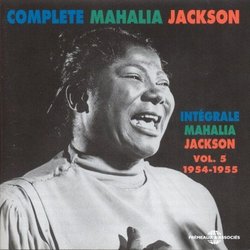| All Artists: Mahalia Jackson Title: Complete Mahalia Jackson: Intégrale Vol. 5: 1954-1955 Members Wishing: 0 Total Copies: 0 Label: Fremeaux & Assoc. Fr Original Release Date: 1/1/2007 Re-Release Date: 8/21/2007 Genres: Blues, Pop, Gospel Styles: Contemporary, Traditional Number of Discs: 1 SwapaCD Credits: 1 |
Search - Mahalia Jackson :: Complete Mahalia Jackson: Intégrale Vol. 5: 1954-1955
 | Mahalia Jackson Complete Mahalia Jackson: Intégrale Vol. 5: 1954-1955 Genres: Blues, Pop, Gospel
|
Larger Image |
CD Details |
CD ReviewsMahalia Goes To The Majors T. A. Shepherd | Palmdale, Ca. 93550 | 01/05/2008 (5 out of 5 stars) "This French label has done a tremendous job of getting Ms. Jackson's recordings to the public. The first four volumes address her complete groundbreaking Apollo releases plus the four sides she recorded for Decca. Many critics and fans agree this was Mahalia's heyday and refuse to venture any further into the next era. After signing with Columbia in 1954, they say her recordings were over-produced and lacked the enthusiasm of her earlier sides. But this is not entirely true. It is unfair to dismiss especially the early Columbia sessions. Now, I do agree "Rusty Old Halo" and "One God" do not compare to "City Called Heaven" and "In The Upper Room", but listen to "Oh Lord Is It I" and the re-recording of Roberta Martin's "Didn't It Rain" and you'll have to agree that there are quite a few moments here. Mitch Miller's material wasn't always suited for this great, talented singer, but history shows he knew how to record and make good use of Jackson's potential. This disc contains the entire first album plus very rare singles, among them being "You'll Never Walk Alone" sung in her trademark long metered style. Many of these recordings haven't been avaialbe since they were first released on 78's. Of equal importance is Thomas A. Dorsey's "I'm Going To Live The Life I Sing About". Her phrasing here is exceptional and only adds further justification of this re-issue. Mildred Falls' piano fills are right on target as also on the uptempo re-make of "Move On Up A Little Higher". Where the Apollo version was mercilessly divided in half to fit on two sides of a 78, on the Columbia release we hear it in one amazing 5 minutes plus track in glorius hi-fidelity. Other landmark recordings are "When I Wake Up In Glory", "Out Of The Deptas" and Clara Ward's "Jesus When Troubles Burdon Me Down". Whereas the Apollo recordings were extremely important, historically tracing Mahalia's humble beginnings as a musician-singer (she shares this title with Ella, Sarah and Billie), the Columbia recordings are essential in that she was able to explore the possibilties of her higher art. Better sound quality plus access to the greatest jazz musicians (Milt Hinton played bass on many of her studio records), brought her exposure no other Gospel artist of her day could ever dream possible. I'm looking forward to Volume 6, where her "Sweet Little Jesus Boy" album will be featured. Other albums which criminally remain out of circulation are "Bless This House", "Great Gettin' Up Morning" and "Make A Joyful Noise". These will undoubtably make their CD appearance in future volumes."
|

 Track Listings (20) - Disc #1
Track Listings (20) - Disc #1